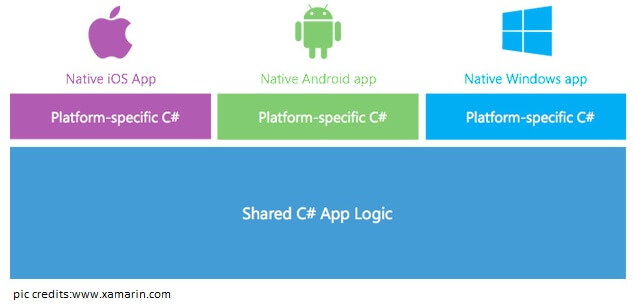Understanding Xamarin
As we have easy access to mobiles, while on the go hence consumers today are moving to mobile Apps for all their needs. In the past few years the development in the areas of mobile and mobile application development, have made these devices a substantial part of our lives.
The mobile App download data was around 65 million in 2012 but now in 2016 it has crossed the 225 million mark. This huge increase in the demand for mobile Apps has pushed the Mobile Application Development industry to look out for solutions in order to develop and deliver excellent Apps.
This need gave birth to cross platform app development frameworks, which uses modern technology to create a single app for multiple platforms. By writing minimal source code it can provide a universal app which runs smoothly across the two dominant platforms (Android and iOS) through native Apps.
Thus, cross platform development helps a company save both time and money and get the app out in the market, quickly.
In the past the journey of cross platform app development framework begun with Titanium, after which many web technology based frameworks such as PhoneGap came into picture. Web technologies however have quite a few limitations against objective C, which is the primary programming language used when writing software codes for iOS and also against Java, which is again the primary language used for Android App development.
This led to the development of Xamarin cross platform framework which uses C# to develop an app which runs perfectly on Android, iOS, Mac, Windows 8 and Windows 8 phone. Xamarin as compared to other cross-platform tools such as PhoneGap and HTML5 provides the consumer which a far better user experience. It also provides better performance and more security.
The main aim of Xamarin platform is to use one and not three languages for the development of Apps. Traditionally, objective-C is used for iOS development, Java for Android and .NET for Windows but with the help of the Xamarin platform we can use C# to produce an App which runs on all the above mentioned operating systems.
Xamarin platform and Microsoft Technologies
The Xamarin cross-platform tool for mobile application development has been developed by the company Xamarin, which was acquired by Microsoft this year. Since the acquisition, Microsoft is investing heavily on the development of this platform. With the Windows app development lagging behind in momentum, Xamarin can be a fresh hope to develop native performing apps on Microsoft technologies. This might even lead to a future where you have Microsoft services on each and every platform. Imagine a scenario where you have Windows Apps on Android and iOS phones – seems by far as of now but definitely can be a possibility.
Advantages of Xamarin platform
Less to learn
For the development of an App on either Android or iOS, one has to be proficient in Java and Objective C respectively. So to work on a cross platform project one will have to learn both of the languages. Further, learning Java and Objective-C environment is not just limited to programming languages as there is also an issue of underlying core classes such as collections, which requires you to understand two different ways of doing the same thing. On the other hand, with Xamarin, you just have to learn one programming language – C#, and one core set of classes which shall be effective on both the platforms. If you’re already an experienced .NET/C# developer then it will be very easy for you to work with Xamarin. And even if you’re not, Xamarin will considerably reduce the time you spend on learning as can be clearly understood by the reasons mentioned above.
Embraces the unique features of each platform
Both Android and iOS have UI and SDK features which are distinct to each of the platform’s appearance and behaviour. Many cross-platform app development tools hide this uniqueness which makes the Apps feel foreign to the platform on which they run. Xamarin on the other side embraces the unique features of each platform. So in addition to .NET classes, it has iOS specific .NET classes and Android specific .NET classes, which highlight the unique features of each platform. This not only allows the applications to share core logic but also take advantage of their unique features.
Faster time to market
Xamarin allows you to code application logic once and share it across both iOS and Android. This saves a lot of time as compared to a situation where logic must be implemented once in Java for Android and then the same logic must be implemented a second time in Objective-C, for iOS. In simple language it prevents us from writing more code get more time to focus on building up the App features and launching the App.
Fewer bugs
Since Xamarin requires writing less code hence one is likely to make few errors, which naturally results in fewer bugs. Also, with the extra time in hand one gets more time for testing the App and eliminating the bugs.
Limitations of Xamarin platform
Although, using Xamarin for mobile application development saves time and resources but it does come with certain limitations –
- When Xamarin is used there is a lot of operational software overhead. This is mainly caused due to the linking of codes and references between the .NET frameworks and the operating system. Due to this the download and start up time of an application is increased.
- Though with Xamarin a majority of code can be shared across multiple platforms however, core UI development is not portable. This means that some of the coding must be done for each platform and UI development unfortunately, can be very time consuming.
- There is limited support for coding outside Xamarin. Code developed in Xamarin cannot be transferred or reused for native or HTML5 applications for iOS/Android.
Future prospects
Xamarin is gaining wide popularity with each passing day. It meets our needs of a tool which supports multiple platforms with minimal duplication work. The future prospect of the Xamarin platform could be having Microsoft service in the form of Windows App on every platform including iOS and Android.
If you also want your App to be developed by using this cross-platform tool then contact Queppelin today, with your requirements.






